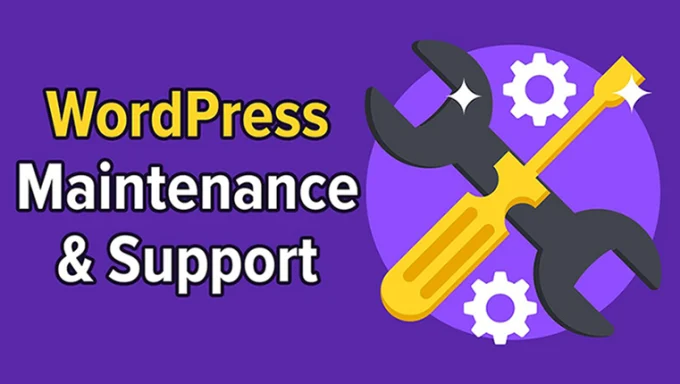Home » Service » WordPress Consulting & Support » WordPress Maintenance and Support
WordPress Maintenance and Support Service
Focus on what you do best, while we keep your website running smoothly and securely. Our WordPress maintenance and support service handles all the technical stuff.






Why Us?
Maintaining a WordPress website can be challenging, but with our WordPress Maintenance and Support Service, you can focus on growing your business while we take care of your website.
01.
Expert Team:Our team consists of WordPress experts who have extensive experience in managing, maintaining, and troubleshooting WordPress sites. We stay updated with the latest WordPress trends and updates to ensure your site runs smoothly.
02.
Regular Updates: Keeping your WordPress site up to date is crucial for security and performance. We handle all core, theme, and plugin updates to ensure your site is always using the latest and most secure versions.
03.
24/7 Support:Our support team is available 24/7 to assist you with any issues that may arise. Whether it's a minor glitch or a major problem, we are here to help you at any time.
04.
Enhanced Security :Security is a top priority for us. We implement robust security measures to protect your site from hackers and malware. Our service includes regular security scans and monitoring to keep your site safe.
05.
Daily Backups : We perform daily backups of your website to ensure that your data is safe and can be restored quickly in case of any issues. You can have peace of mind knowing your website data is secure.
06.
Performance Optimization : A fast-loading website is essential for a good user experience and SEO. We optimize your site for speed and performance, ensuring that your visitors have a seamless experience.






Spinah’s Advantage
At Spinah, we take the hassle out of managing your WordPress website. Our comprehensive maintenance and support services ensure your site runs smoothly, securely, and efficiently.
Regular Updates
Keeping your WordPress core, themes, and plugins updated is crucial for security and performance. Our team handles all updates promptly, ensuring compatibility and minimizing downtime.
Security Monitoring
We provide 24/7 security monitoring to protect your website from threats. Our proactive approach includes malware scanning, firewall protection, and regular security audits to keep your site safe.
Backup Solutions
Your data is precious. We implement automated daily backups and store them securely, so you can quickly restore your site in case of any issues. Regularly scan your site for malware and vulnerabilities.
Performance Optimization
A fast website enhances user experience and boosts SEO. We optimize your site’s speed by cleaning up databases, optimizing images, and leveraging caching techniques.
Uptime Monitoring
Downtime can hurt your business. We continuously monitor your website’s uptime and respond immediately to any issues, ensuring your site is always accessible.
Custom Support
Every website is unique. Our dedicated support team is available to assist with any issues, from troubleshooting errors to providing advice on improvements.
The Website You've Been Dreaming Of
Let's build a website that's not just responsive but also SEO-friendly and user-centric.
What Is WordPress Maintenance?
Definition
WordPress maintenance is like taking your car in for regular check-ups and tune-ups. It’s the ongoing care your website needs to stay secure, run smoothly, and perform at its best. Just like a car, WordPress is software, and it requires updates to fix bugs, improve security, and add new features.
Maintenance also involves backing up your site in case of emergencies, monitoring for security threats, and optimizing your website for speed and performance. By regularly attending to these tasks, you ensure your website remains a reliable and positive experience for visitors.
The Role of WordPress Support
1. Troubleshooting Expertise
Even with regular maintenance, issues can arise. WordPress support provides a team of experts to diagnose and fix problems you encounter, from plugin conflicts to layout issues.
2. Security Updates & Monitoring
Staying on top of the latest security patches and potential threats can be overwhelming. Support handles these updates and proactively monitors your site for vulnerabilities, keeping it safe from malware and hackers.
3. Optimization & Performance
A slow website frustrates visitors. Support can optimize your site’s performance, ensuring fast loading times and a smooth user experience. This can also improve your search engine ranking.
Content and Functionality
Broken Link Checker: Fix broken links on your website. Broken links provide a poor user experience and can hurt your SEO.
Database Optimization: Over time, your database can become cluttered. Optimize it to improve performance.
Image Optimization: Large images can significantly slow down your site. Use plugins or tools to optimize image sizes without sacrificing quality.
Tips for Self-Maintenance and Support
Managing a WordPress website can be rewarding, but keeping it running smoothly requires some ongoing effort. While professional support offers a great solution.
- Set a regular schedule to check for and install updates for WordPress core, themes, and plugins. This ensures you benefit from the latest features, security patches, and bug fixes.
LEARN MORE ➤
Always create a full website backup before installing any updates. This allows you to rollback in case an update introduces unexpected issues.
LEARN MORE ➤
Use strong, unique passwords for your WordPress admin account and any other user accounts on your site.
LEARN MORE ➤
Consider using a reputable security plugin to add an extra layer of protection. These can help with malware scans, login attempts monitoring, and other security measures.
LEARN MORE ➤
Enable features that limit login attempts to prevent brute-force attacks.
LEARN MORE ➤
Choose a reliable web hosting provider with a good reputation for speed and uptime.
Company
Services
- WordPress Development
- WordPress Design
- WordPress Optimization
- WordPress Consulting
- WordPress Support

Copyright 2025 Spinah All Rights Reserved




